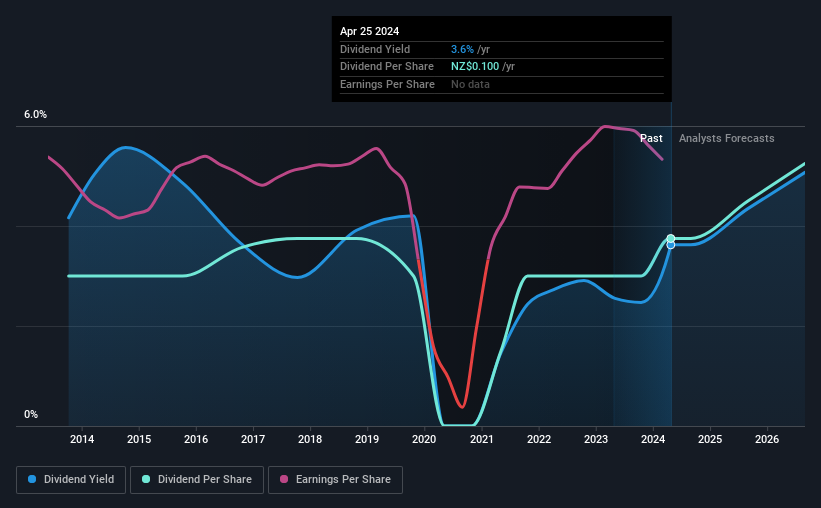Stock Analysis
- New Zealand
- /
- Machinery
- /
- NZSE:SCT
Why It Might Not Make Sense To Buy Scott Technology Limited (NZSE:SCT) For Its Upcoming Dividend

It looks like Scott Technology Limited (NZSE:SCT) is about to go ex-dividend in the next 4 days. The ex-dividend date occurs one day before the record date which is the day on which shareholders need to be on the company's books in order to receive a dividend. The ex-dividend date is of consequence because whenever a stock is bought or sold, the trade takes at least two business day to settle. Therefore, if you purchase Scott Technology's shares on or after the 30th of April, you won't be eligible to receive the dividend, when it is paid on the 15th of May.
The company's next dividend payment will be NZ$0.0544117 per share, on the back of last year when the company paid a total of NZ$0.10 to shareholders. Based on the last year's worth of payments, Scott Technology stock has a trailing yield of around 3.6% on the current share price of NZ$2.76. We love seeing companies pay a dividend, but it's also important to be sure that laying the golden eggs isn't going to kill our golden goose! So we need to check whether the dividend payments are covered, and if earnings are growing.
View our latest analysis for Scott Technology
Dividends are typically paid out of company income, so if a company pays out more than it earned, its dividend is usually at a higher risk of being cut. Scott Technology paid out more than half (60%) of its earnings last year, which is a regular payout ratio for most companies. A useful secondary check can be to evaluate whether Scott Technology generated enough free cash flow to afford its dividend. Scott Technology paid a dividend despite reporting negative free cash flow over the last twelve months. This may be due to heavy investment in the business, but this is still suboptimal from a dividend sustainability perspective.
Click here to see the company's payout ratio, plus analyst estimates of its future dividends.

Have Earnings And Dividends Been Growing?
Stocks with flat earnings can still be attractive dividend payers, but it is important to be more conservative with your approach and demand a greater margin for safety when it comes to dividend sustainability. Investors love dividends, so if earnings fall and the dividend is reduced, expect a stock to be sold off heavily at the same time. It's not encouraging to see that Scott Technology's earnings are effectively flat over the past five years. We'd take that over an earnings decline any day, but in the long run, the best dividend stocks all grow their earnings per share.
Many investors will assess a company's dividend performance by evaluating how much the dividend payments have changed over time. In the past 10 years, Scott Technology has increased its dividend at approximately 2.3% a year on average.
To Sum It Up
Has Scott Technology got what it takes to maintain its dividend payments? Scott Technology is paying out a reasonable percentage of its income yet an uncomfortably high -19% of its cash flow as dividends. What's more, earnings have barely grown. It's not an attractive combination from a dividend perspective, and we're inclined to pass on this one for the time being.
Although, if you're still interested in Scott Technology and want to know more, you'll find it very useful to know what risks this stock faces. For example, Scott Technology has 3 warning signs (and 1 which is significant) we think you should know about.
A common investing mistake is buying the first interesting stock you see. Here you can find a full list of high-yield dividend stocks.
Valuation is complex, but we're helping make it simple.
Find out whether Scott Technology is potentially over or undervalued by checking out our comprehensive analysis, which includes fair value estimates, risks and warnings, dividends, insider transactions and financial health.
View the Free AnalysisHave feedback on this article? Concerned about the content? Get in touch with us directly. Alternatively, email editorial-team (at) simplywallst.com.
This article by Simply Wall St is general in nature. We provide commentary based on historical data and analyst forecasts only using an unbiased methodology and our articles are not intended to be financial advice. It does not constitute a recommendation to buy or sell any stock, and does not take account of your objectives, or your financial situation. We aim to bring you long-term focused analysis driven by fundamental data. Note that our analysis may not factor in the latest price-sensitive company announcements or qualitative material. Simply Wall St has no position in any stocks mentioned.
About NZSE:SCT
Scott Technology
Scott Technology Limited, designs, manufactures, sells, and services automated and robotic production lines, and processes for various industries in New Zealand and internationally.
Reasonable growth potential with adequate balance sheet.

